Filter by

We Are Coming Home Repatriation and the Restoration of Blackfoot Cultural Co…
In 1990, Gerald Conaty was hired as senior curator of ethnology at the Glenbow Museum, with the particular mandate of improving the museum’s relationship with Aboriginal communities. That same year, the Glenbow had taken its first tentative steps toward repatriation by returning sacred objects to First Nations’ peoples. These efforts drew harsh criticism from members of the provincial gover…
- Edition
- -
- ISBN/ISSN
- 9781771990172.01
- Collation
- -
- Series Title
- -
- Call Number
- 304 pages
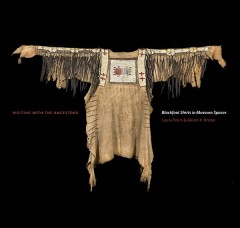
Visiting With the Ancestors Blackfoot Shirts in Museum Spaces
In 2010, five magnificent Blackfoot shirts, now owned by the University of Oxford’s Pitt Rivers Museum, were brought to Alberta to be exhibited at the Glenbow Museum, in Calgary, and the Galt Museum, in Lethbridge. The shirts had not returned to Blackfoot territory since 1841, when officers of the Hudson’s Bay Company acquired them. The shirts were later transported to England, where they h…
- Edition
- -
- ISBN/ISSN
- 9781771990370.01
- Collation
- -
- Series Title
- -
- Call Number
- 10.5 x 10, 232 pages
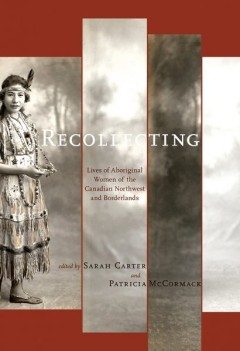
Recollecting Lives of Aboriginal Women of the Canadian Northwest and Borderl…
Some essays focus on individuals—a trader, a performer, a non-human woman. Other essays examine cohorts of women—wives, midwives, seamstresses, nuns. Authors look beyond the documentary record and standard representations of women, drawing on records generated by the women themselves, including their beadwork, other material culture, and oral histories. Exploring the constraints and boundar…
- Edition
- -
- ISBN/ISSN
- 9781897425824.01
- Collation
- -
- Series Title
- The West Unbound: Social and Cultural Studies
- Call Number
- 432 pages
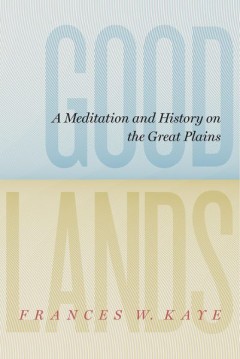
Goodlands A Meditation and History on the Great Plains
Amer-European settlement of the Great Plains transformed bountiful Native soil into pasture and cropland, distorting the prairie ecosystem as it was understood and used by the peoples who originally populated the land. Settlers justified this transformation with the unexamined premise of deficiency, according to which the Great Plains region was inadequate in flora and fauna and the region lack…
- Edition
- -
- ISBN/ISSN
- 9781897425985.01
- Collation
- -
- Series Title
- The West Unbound: Social and Cultural Studies
- Call Number
- 388 pages
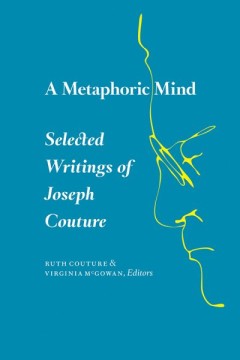
A Metaphoric Mind Selected Writings of Joseph Couture
With a foreword by Lewis Cardinal, A Metaphoric Mind brings together for the first time key works selected from among Dr. Joe’s writings, published and unpublished. Spanning nearly thirty years, the essays invite us to share in his transformative legacy through a series of encounters, with Aboriginal spirituality and ancestral ways of knowing, with Elders and their teachings, with education a…
- Edition
- -
- ISBN/ISSN
- 9781926836522.01
- Collation
- -
- Series Title
- -
- Call Number
- 329 pages
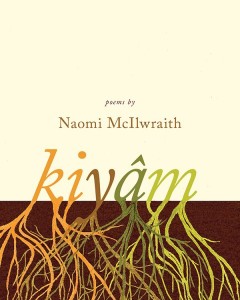
kiyâm
Through poems that move between the two languages, McIlwraith explores the beauty of the intersection between nêhiyawêwin, the Plains Cree language, and English, âkayâsîmowin. Written to honour her father’s facility in nêhiyawêwin and her mother’s beauty and generosity as an inheritor of Cree, Ojibwe, Scottish, and English, kiyâm articulates a powerful yearning for family, history, …
- Edition
- -
- ISBN/ISSN
- 9781926836690.01
- Collation
- -
- Series Title
- -
- Call Number
- 178 pages
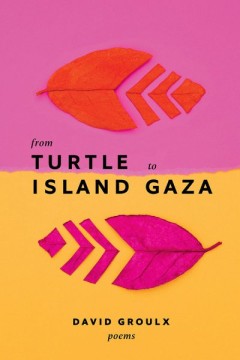
From Turtle Island to Gaza
With a sure voice, Groulx, an Anishnaabe writer, artistically weaves together the experiences of Indigenous peoples in settler Canada with those of the people of Palestine, revealing a shared understanding of colonial pasts and presents.
- Edition
- -
- ISBN/ISSN
- 9781771992619.01
- Collation
- -
- Series Title
- -
- Call Number
- 5 x 7.5, 68 pages
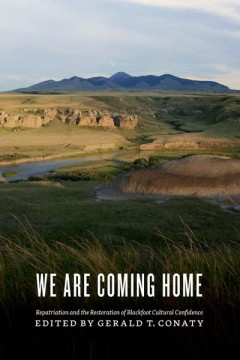
We Are Coming Home Repatriation and the Restoration of Blackfoot Cultural Co…
We Are Coming Home is the story of the highly complex process of repatriation as described by those intimately involved in the work, notably the Piikani, Siksika, and Kainai elders who provided essential oversight and guidance. We also hear from the Glenbow Museum’s president and CEO at the time and from an archaeologist then employed at the Provincial Museum of Alberta who provides an inside…
- Edition
- -
- ISBN/ISSN
- 9781771990172.01
- Collation
- -
- Series Title
- -
- Call Number
- 304 pages
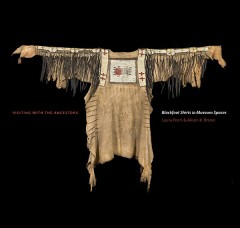
Visiting With the Ancestors Blackfoot Shirts in Museum Spaces
In the pages of this beautifully illustrated volume is the story of an effort to build a bridge between museums and source communities, in hopes of establishing stronger, more sustaining relationships between the two and spurring change in prevailing museum policies. Negotiating the tension between a museum’s institutional protocol and Blackfoot cultural protocol was challenging, but the expe…
- Edition
- -
- ISBN/ISSN
- 9781771990370.01
- Collation
- -
- Series Title
- -
- Call Number
- 10.5 x 10, 232 pages
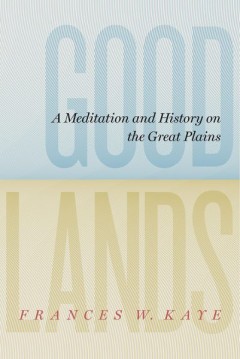
Goodlands A Meditation and History on the Great Plains
Amer-European settlement of the Great Plains transformed bountiful Native soil into pasture and cropland, distorting the prairie ecosystem as it was understood and used by the peoples who originally populated the land. Settlers justified this transformation with the unexamined premise of deficiency, according to which the Great Plains region was inadequate in flora and fauna and the region lack…
- Edition
- -
- ISBN/ISSN
- 9781897425985.01
- Collation
- -
- Series Title
- The West Unbound: Social and Cultural Studies
- Call Number
- 388 pages
 Computer Science, Information & General Works
Computer Science, Information & General Works  Philosophy & Psychology
Philosophy & Psychology  Religion
Religion  Social Sciences
Social Sciences  Language
Language  Pure Science
Pure Science  Applied Sciences
Applied Sciences  Art & Recreation
Art & Recreation  Literature
Literature  History & Geography
History & Geography